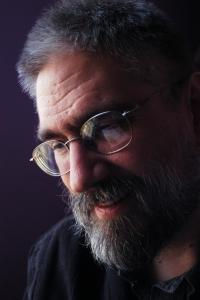For the 111 Mystics Project, I've been slowly reading Pseudo-Macarius' Fifty Spiritual Homilies. I'm taking my time not so much because his writing is a snooze; on the contrary, I'm finding it rich and dense with layers of meaning — worthy of a slow, lectio divina style of approach. Methodists, take note: the sermons of Pseudo-Macarius received high praise from John Wesley (among many others). Equalled only by Evagrius among the mystics of his day, this unknown homilist from the fourth century was believed to be Macarius of Egypt, but although he wrote in Greek his theology and sensibility point rather to his being from Syria. Because his work consists of sermons, his style is largely exhortatory; he is continually calling his listeners/readers to a life of utter and single-minded devotion to the God who lovingly imparts grace on those who seek it, even while he is relentless in his judgment on those whose hearts lie elsewhere. Standard fare for a fourth-century preacher? Perhaps, although Pseudo-Macarius distinguishes himself with both a poetic style and occasional bursts of luminous imagery as he rhapsodizes on the resplendent joy of the indwelling presence of God.
Last night I was reading Homily 30 and this sentence caught my eye:
Therefore, he who seeks to believe and to approach to the Lord must beg while here on earth to receive the divine Spirit.
Wow. That sentence stayed with me, and turned over and over again in my mind during my prayer time this morning. I thought about how, as a middle class American, I'm "too proud to beg" — my self-esteem is wound up in being self-sufficient, able to take care of myself and my family, not needing anyone's help to get by. And when I do need someone's help (which is more of a reality when a handicapped person is part of your family), I have learned to ask. To ask, but never to beg.
My brother and I were talking the other day about how dad has a rough time in the hospital because he doesn't like to ask for what he needs. So I get it honestly. As my brother put it, "Hey, it's self-reliance. I never ask my wife to get me something out of the refrigerator, I just go get it myself. Works great while you do those kinds of things, but it leaves you ill-equipped to function in a hospital setting, where you have to rely on others to care for you."
How true. And perhaps for those of us who seek the treasure of the Christian mystery, we are by nature "in hospital" — for we require the care of others (or at least, of The Other) to receive the transformation we seek. And what is that transformation? What is all healing, all embracing of joy, all empowerment and self-actualization, other than to become partakers of the Divine Nature? In other words, to be filled with the loving Spirit that is so graciously poured out upon us?
But Pseudo-Macarius advises us to beg for the coming of this indwelling Spirit. To beg! Immediately I resist the idea. Begging seems so, well, undignified. And after spending ten years as an Episcopalian, nothing — I mean, nothing — is more important to me than to be dignified in worship. Okay, so I'm being facetious, but my humor is based so solidly on an unconscious reality that it's just a little uncomfortable even to type out these words. The plain bald reality is, I don't want to beg for God.
And yet, deep down, I know I must.
I know that part of creating the space within me, a space where the Spirit can be poured into, is to simply get out of my own way. Which means letting go of my obstinate insistence on calling my own shots. No, I don't get to say how dignified my experience of mysticism or of God's indwelling presence gets to be. God is not my puppet to order around like that. I do not "ask" God for a Spiritual blessing in a manner similar to how I might ask my brother to loan me some money. This isn't an asking that implies a basic equality between the parties. No, begging makes more sense, for this is a transaction where the lines are clearly drawn between the one who is in utter need (i.e., me) and the one who is in a position to give graciously and without any hope of return (i.e., the Source of all love and being). In my longing, my yearning, my desperate pleading for God's Spirit, I tell the universe (and even more importantly, my own ego) that I am in such a position of need that I, as the old Temptations song so bluntly puts it, "ain't too proud to beg."
And it's in stepping away from that insidious pride — that "I'm in control here" sensibility — that I finally open myself up to receive the kinds of blessings that are not only beyond my capacity, but beyond even my imagining.
